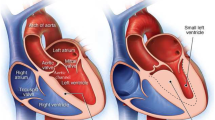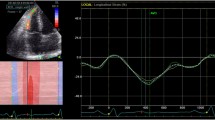Abstract
Septal Flash (SF) is a rapid leftward – rightward motion of the septal wall during the isovolumic contraction phase that is frequently but not always observed in heart failure patients with left bundle branch block (LBBB). The goal of the present study is to evaluate the feasibility of detecting SF by assessing septal curvature both in patients with LBBB using MRI and in simulations using the CircAdapt model of the heart and circulation. In both patients and simulations, SF was characterized by a decrease of septal wall curvature and septum to lateral wall distance, followed by a rapid increase prior to aortic valve opening. Additionally, computer simulations revealed that SF can be explained by an intra-left ventricular (septal-to-lateral wall) activation delay. Reducing contractility in the left ventricular free wall abolished the rightward SF motion in LBBB. This finding suggests that lack of SF may indicate co-morbidities that can result in non-response to cardiac resynchronization therapy.
Access this chapter
Tax calculation will be finalised at checkout
Purchases are for personal use only
Similar content being viewed by others
References
Dillon, J.C., Chang, S., Feigenbaum, H.: Echocardiographic manifestations of left bundle branch block. Circulation 49, 876–880 (1974)
Sohal, M., Amraoui, S., Chen, Z., Sammut, E., Jackson, T., Wright, M., O’Neill, M., Gill, J., Carr-White, G., Rinaldi, C.A., Razavi, R.: Combined identification of septal flash and absence of myocardial scar by cardiac magnetic resonance imaging improves prediction of response to cardiac resynchronization therapy. J. Interv. Card. Electrophysiol. 40, 179–190 (2014)
Leenders, G.E., Cramer, M.J., Bogaard, M.D., Meine, M., Doevendans, P.A., De Boeck, B.W.: Echocardiographic prediction of outcome after cardiac resynchronization therapy: conventional methods and recent developments. Heart Fail. Rev. 16, 235–250 (2011)
Duckett, S.G., Camara, O., Ginks, M.R., Bostock, J., Chinchapatnam, P., Sermesant, M., Pashaei, A., Lambiase, P.D., Gill, J.S., Carr-White, G.S., Frangi, A.F., Razavi, R., Bijnens, B.H., Rinaldi, C.A.: Relationship between endocardial activation sequences defined by high-density mapping to early septal contraction (septal flash) in patients with left bundle branch block undergoing cardiac resynchronization therapy. Europace 14, 99–106 (2012)
Duchateau, N., Sitges, M., Doltra, A., Fernandez-Armenta, J., Solanes, N., Rigol, M., Gabrielli, L., Silva, E., Barcelo, A., Berruezo, A., Mont, L., Brugada, J., Bijnens, B.: Myocardial motion and deformation patterns in an experimental swine model of acute LBBB/CRT and chronic infarct. Int. J. Cardiovasc. Imaging 30, 875–887 (2014)
Leenders, G.E., Lumens, J., Cramer, M.J., De Boeck, B.W., Doevendans, P.A., Delhaas, T., Prinzen, F.W.: Septal deformation patterns delineate mechanical dyssynchrony and regional differences in contractility: analysis of patient data using a computer model. Circ. Heart Fail. 5, 87–96 (2012)
Dellegrottaglie, S., Sanz, J., Poon, M., Viles-Gonzalez, J.F., Sulica, R., Goyenechea, M., Macaluso, F., Fuster, V., Rajagopalan, S.: Pulmonary hypertension: accuracy of detection with left ventricular septal-to-free wall curvature ratio measured at cardiac MR. Radiology 243, 63–69 (2007)
Wu, V., Chyou, J.Y., Chung, S., Bhagavatula, S., Axel, L.: Evaluation of diastolic function by three-dimensional volume tracking of the mitral annulus with cardiovascular magnetic resonance: comparison with tissue Doppler imaging. J. Cardiovasc. Magn. Reson. 16, 71 (2014)
Arts, T., Delhaas, T., Bovendeerd, P., Verbeek, X., Prinzen, F.W.: Adaptation to mechanical load determines shape and properties of heart and circulation: the CircAdapt model. Am. J. Physiol. Heart Circ. Physiol. 288, H1943–H1954 (2005)
Lumens, J., Delhaas, T., Kirn, B., Arts, T.: Three-wall segment (TriSeg) model describing mechanics and hemodynamics of ventricular interaction. Ann. Biomed. Eng. 37, 2234–2255 (2009)
Author information
Authors and Affiliations
Corresponding author
Editor information
Editors and Affiliations
Rights and permissions
Copyright information
© 2015 Springer International Publishing Switzerland
About this paper
Cite this paper
Huntjens, P.R., Walmsley, J., Wu, V., Delhaas, T., Axel, L., Lumens, J. (2015). Assessment of Septal Motion Abnormalities in Left Bundle Branch Block Patients Using Computer Simulations. In: van Assen, H., Bovendeerd, P., Delhaas, T. (eds) Functional Imaging and Modeling of the Heart. FIMH 2015. Lecture Notes in Computer Science(), vol 9126. Springer, Cham. https://doi.org/10.1007/978-3-319-20309-6_5
Download citation
DOI: https://doi.org/10.1007/978-3-319-20309-6_5
Published:
Publisher Name: Springer, Cham
Print ISBN: 978-3-319-20308-9
Online ISBN: 978-3-319-20309-6
eBook Packages: Computer ScienceComputer Science (R0)




